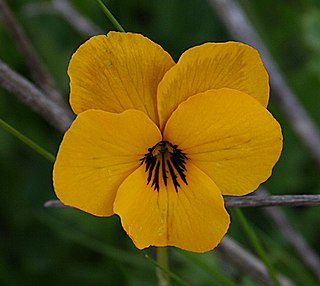
Viola pedunculata, the California golden violet, Johnny jump up, or yellow pansy, is a perennial yellow wildflower of the coast and coastal ranges in California and northwestern Baja California. The common name "Johnny jump up" is usually associated with Viola tricolor however, the introduced garden annual.

Clarkia amoena, commonly known as farewell to spring, godetia, or satin flower, is a species of flowering plant native to western North America. It is found in coastal hills and mountains from British Columbia south to the San Francisco Bay Area of California.

Armeria maritima, the thrift, sea thrift or sea pink, is a species of flowering plant in the family Plumbaginaceae. It is a compact evergreen perennial which grows in low clumps and sends up long stems that support globes of bright pink flowers. In some cases purple, white or red flowers also occur. It is a popular garden flower and has been distributed worldwide as a garden and cut flower. It does well in gardens designed as xeriscapes or rock gardens. The Latin specific epithet maritima means pertaining to the sea or coastal.

Phacelia fremontii is a flowering plant in the family Boraginaceae native to the southwestern United States. In California, its range includes the Mojave Desert, the San Joaquin Valley, the Coast Ranges, and the Sierra Nevada. It was named for John C. Frémont.

Monardella is a genus of approximately 40 species of annual and perennial plants native to western North America from British Columbia to northwestern Mexico. They are grown for their highly aromatic foliage, which in some species is used for herbal teas. The two-lipped, tubular flowers are formed in terminal clusters and are most usually red, pink, or purple.

Primula clevelandii, with the common name of Padre's shooting star, is a species of primrose.

Castilleja rubicundula is a species of Indian paintbrush known by the common name cream sacs. It is native to northern California and southwestern Oregon. It is found in coastal and inland grasslands.

Hooveria purpurea is a species of flowering plant related to the agaves known by the common name purple amole. This species of soap plant is endemic to California, where it grows in the Santa Lucia Range, in the Central Coast region. There are two varieties of this plant, and both are believed to be quite rare. It is a federally listed threatened species.
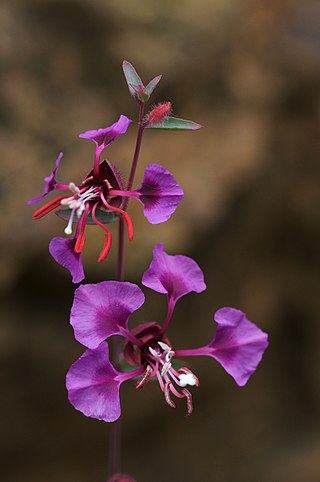
Clarkia unguiculata is a species of wildflower known by the common name elegant clarkia or mountain garland. The plant was named after Captain William Clark who was part of the Lewis and Clark Expedition.

Sambucus racemosa is a species of elderberry known by the common names red elderberry and red-berried elder.
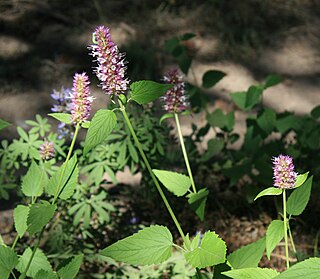
Agastache urticifolia is a species of flowering plant in the mint family known by the common name nettleleaf giant hyssop or horse mint.
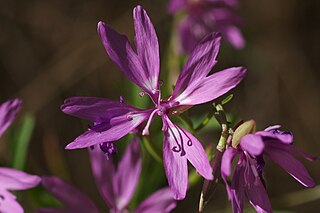
Clarkia biloba is a species of flowering plant in the evening primrose family known by the common name twolobe clarkia and two lobed clarkia.
Clarkia rostrata is a species of flowering plant in the evening primrose family known by the common name beaked clarkia.

Clarkia tembloriensis is a rare species of flowering plant in the evening primrose family, known by the common name Temblor Range clarkia and belonging to the Onagraceae family.

Clarkia pulchella, also known as pinkfairies, ragged robin, and deerhorn clarkia, is a species of flowering plant in the family Onagraceae.

Monardella purpurea is a species of flowering plant in the mint family known by the common names Siskiyou monardella and serpentine monardella.

Sidalcea malviflora is a species of flowering plant in the mallow family, known by the common names dwarf checkerbloom, Greek mallow, prairie mallow and dwarf checkermallow.
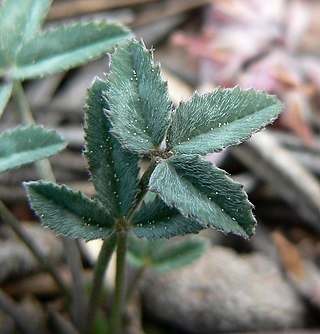
Trifolium gymnocarpon is a species of clover known by the common name hollyleaf clover.
Monardella stoneana is a rare species of flowering plant in the mint family known by the common name Jennifer's monardella.

Dudleya cymosa subsp. paniculata, known by the common name Diablo Range dudleya, is a species of perennial succulent plant in the family Crassulaceae native to the Inner South Coast Range of California. It is characterized by pale yellowish flowers, oblong to oblanceolate leaves and a growth habit not limited to a single substrate. It is closely related to Dudleya abramsii subsp. setchellii.





















